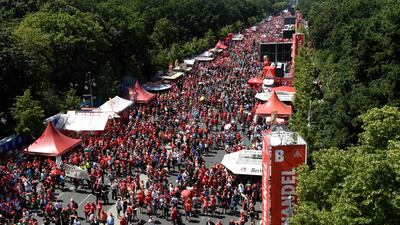It has been described as "the defining issue of our time" – yet we are still a long way from achieving the goals set by the 2015 Paris Accord. As 1,000 political leaders, environmental experts and officials from the United Nations converge on Abu Dhabi for a two-day meeting, intended to set the agenda for a UN climate action summit in New York in September, the urgency of the global crisis has never been more pressing. With the Intergovernmental Panel on Climate Change recently warning that global temperatures are set to rise to 3C above pre-industrial levels by 2100 – well above the 1.5C limit of the Paris agreement – and the clock ticking on commitments to reduce greenhouse gases and switch to clean energy sources, none can afford to ignore the threat, despite the best efforts of climate change deniers. As Thani Al Zeyoudi, the UAE's Minister of Climate Change and the Environment, says, the threat is "so serious that it requires international co-operation and multilateral climate action".
Europe has been in the grip of an unprecedented heatwave in the past few days, with record-breaking temperatures in France, Germany, the Czech Republic and Spain. The highest ever recording of 44.3C in France is on a par with the kind of tropical heat experienced in this part of the world, not western Europe, and a worrying sign of abnormally high-pressure weather systems, thought to be caused by greenhouse gases trapping heat and making temperatures rise. Dealing with the potentially catastrophic consequences of climate change demands concerted international efforts for a global problem that affects us all. Governments and authorities around the world are unprepared to deal with the impact. There needs to be a drastic reduction in consumption and a significant change in behaviour at all levels of society – from governments and corporations to individual consumers – to effect change. All three tiers must be invested in a circular economy to minimise waste.
Critically, that requires words to be followed by swift action. Many of the leaders at today's meeting agree that responses to date have been inadequate. As Mr Al Zeyoudi says, this is not a "business as usual event". There needs to be serious concerted efforts by both the public and private sectors to support investment opportunities to promote a green economy. The UAE has been at the forefront of promoting renewable energy, pledging to generate a quarter of its electricity from clean sources within two years. Vision 2021 aims to create more sustainable infrastructure and new methods of agricultural cultivation and creating marine biodiversity are being explored. Meanwhile India has begun increasing taxes on coal production and Nigeria has invested more than $20 billion in solar power and aims to generate 30 per cent of its energy from renewable sources by 2030. As these shifts demonstrate, merely reducing emissions will only limit the damage; affirmative action is needed to create positive change.

